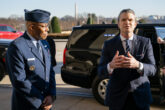October 28, 2019
End harassment at VA hospitals
When I ran the VA’s Center for Women Veterans, one of my highest priorities was changing the culture throughout the organization to be more welcoming of women veterans, who make up a small but rapidly growing percentage of our nation’s veterans. That work is deeply necessary: Alarming research by the department found that one in four women veterans using VA health care “reported inappropriate and/or unwanted comments or behavior by male veterans on VA grounds.” Unsurprisingly, women who experienced that harassment were less likely to feel welcome, which could lead to them delaying or missing needed care. Just like in the military, younger women are at higher risk of experiencing that harassment.
Based on that research, VA established a national workgroup to identify effective programs from other settings and pilot interventions to end harassment; I was proud to play a small role on it. The ongoing need for this vital work was driven home when a senior policy adviser on issues affecting women veterans who works on Capitol Hill reported being assaulted at the D.C. VA just last month, drawing additional attention from lawmakers and the public about the extent of the problem and urgency of continuing to address it vigorously.
All veterans deserve to be treated with dignity and respect when they seek health care at VA medical centers. The End Harassment campaign launched by VA is one important component of ensuring men seeking care understand what types of behavior are not acceptable, that women veterans know they can report being treated inappropriately, and that VA employees have been trained on what steps they can take to intervene effectively.
Read the full article in The Hill.
More from CNAS
-
National Security Human Capital Program
Defending the Army’s Command Assessment ProgramThe concept for CAP — developed during the first Trump administration — benefited from the guidance, input and oversight from the foremost scholar and practitioner on military...
By Katherine L. Kuzminski
-
National Security Human Capital Program
‘Women Don’t Just Achieve…They Excel’: Fmr. Marine Corps Attack PilotDr. Kyleanne Hunter, former Marine Corps attack pilot and CEO of Iraq & Afghanistan Veterans of America, says “women are the fastest growing group of veterans” and “the fastes...
By Dr. Kyleanne Hunter
-
National Security Human Capital Program
Could the U.S. Bring Back the Draft?In this episode of At the Boundary, GNSI’s Dr. Guido Rossi sits down with Katherine Kuzminski, Director of Studies at the Center for a New American Security (CNAS), to explore...
By Katherine L. Kuzminski
-
National Security Human Capital Program
Hegseth Brings the Culture War to CombatThe fundamental challenge of military leadership lies in creating cohesive teams that can work together in an environment of mortal risk and, when called upon to do so, use le...
By Dr. Jason Dempsey




